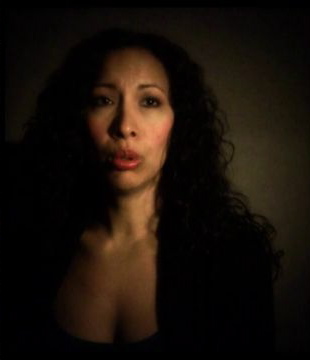Even with Cabell’s artistry, Gordon songs pale over the long haul

The superb American lyric soprano Nicole Cabell was in top vocal form Tuesday night at the Martin Theatre at Ravinia. No stranger to local audiences, she has contributed memorable performances at the Lyric Opera as well as most of the world’s major companies. Her rich, lustrous soprano has enlivened stage roles by Mozart, Puccini, Verdi, and a growing chunk of French repertoire.
Considering her bountiful vocal and dramatic assets, it was disappointing to note that the 850-seat theater was scarcely half occupied. When a program is devoted entirely to a living composer, the box office is bound is take a serious hit. Yet the music of Ricky Ian Gordon, for all of its assets and drawbacks, provides few challenges that would unsettle even the most tradition-bound devotees of the vocal arts.
With the composer at the keyboard, Cabell choose works from two cycles included in her 2012 disc for Blue Griffin, “Silver Rain.” Gordon has a fine ear for poetry, often plucking from such American first stringers as Emily Dickinson, Dorothy Parker, Edna St. Vincent Millay and e. e. cummings. No one has stoked his imagination as consistently as Langston Hughes, the author of all 22 poems set to music for this program.
While Hughes had roots in the Midwest (a local residence led to a popular column in the Chicago Defender), he was best known as the central figure in the Harlem Renaissance. Given that his life and work was saturated with the sound of African American music, one might expect to hear the pull of blues and jazz in Gordon’s settings. Yet what very little exists in his songs is diluted to near extinction. Gordon’s idiom draws principally from the populist mid-century styles of Copland and Barber, with healthy doses of French music from a century ago and the Broadway vocal parlance of recent decades. Though not without challenges for the singer, his writing is consistently idiomatic and served as an effective vehicle for a vocalist with the considerable chops of Cabell.
Taken individually, most of the songs were modestly successful, illuminating text with a measure of insight and deftly adapting morsels of sinewy melodic phrases to the human voice. Here and there impressionistic touches were effectively employed, and hints of Ravel were heard to nice effect in Winter Moon, among others.
Occasional drops of gospel and blues idioms filtered through, most notably in the lush and lyrical Song for a Dark Girl and Daybreak in Alabama. But after a few numbers Gordon’s trademark harmonies took on the baggage of cliché, most notably in the piano lines. Textures were insufficiently varied, tempos seemed stuck in middle gears (not a genuinely fast nugget in the entire 80-minute program), and the harmonic vocabulary felt too restrained to convey the range of emotion and circumstance in Hughes’ powerful poems.
The songs from the earlier set, “Genius Child,” fared better. More varied tempi gave Cabell a better shot at making the text intelligible, and structures were a tad less predictable. To Be Somebody unfolded at a pace well matched to the poem, and Gordon’s evocation of a coveted Steinway was amusingly effective. The simple repetitions of Prayer were genuinely moving, but Love Song for Antonia sounded out of place, seemingly plucked from the Broadway stage and gussied up for an art song presentation. Only Heaven, an homage to Satie and the title work of the other cycle of the program, was a touching, understated encore.
As admirable as Cabell’s dedication to Gordon is, few composers are able to sustain interest for an entire program. After a handful of these works, the ear longed for a detour into other veins of the expansive American songbook.
The program notes included a lengthy first-person background piece from the composer as well as the usual performer bios, but, unforgivably, nary a sentence about Langston Hughes.
Posted in Performances





Posted Aug 06, 2013 at 7:44 am by Plush
A fair review I say. I agree that the program needed variety.
The thing that I found off putting was how rushed the program seemed. A new song began almost right after one ended. The harmonic content blended together so much that little was memorable. There was no time for the emotional quality of the music to sink in. Just a fast ride that simply did not distinguish itself. A miscalculation by Cabell.